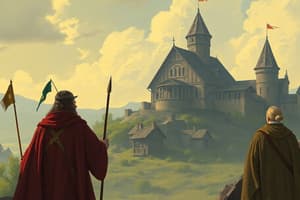Podcast
Questions and Answers
What is the primary focus of the study of history?
What is the primary focus of the study of history?
- Study of past events, societies, and cultures (correct)
- Preservation of modern artifacts
- Analysis of current political systems
- Research into future societal trends
Which of the following are considered primary sources in historical research?
Which of the following are considered primary sources in historical research?
- Original documents like letters and diaries (correct)
- Biographies
- Interpretations of historical events
- Modern scholarly articles
What period is characterized by the study of civilizations such as Mesopotamia and Egypt?
What period is characterized by the study of civilizations such as Mesopotamia and Egypt?
- Modern History
- Medieval Period
- Ancient History (correct)
- Prehistoric Era
What is one of the key themes examined in historical studies?
What is one of the key themes examined in historical studies?
Which historian is recognized as the 'Father of History' for his narrative style?
Which historian is recognized as the 'Father of History' for his narrative style?
Flashcards are hidden until you start studying
Study Notes
Definition of History
- Study of past events, societies, and cultures.
- Involves analysis and interpretation of evidence.
Importance of History
- Helps understand human behavior and societal changes.
- Provides context for current events.
- Aids in the preservation of cultural identity.
Sources of Historical Evidence
-
Primary Sources
- Original documents (letters, diaries, photographs).
- Artifacts (tools, clothing, buildings).
- Official records (government documents, birth certificates).
-
Secondary Sources
- Analyses or interpretations of primary sources (books, articles).
- Historical narratives by scholars.
Major Periods in History
-
Prehistoric Era
- Time before written records.
- Study of archaeology and anthropology.
-
Ancient History
- Civilizations such as Mesopotamia, Egypt, Greece, and Rome.
- Development of writing, trade, and governance.
-
Medieval Period
- Fall of the Roman Empire to the Renaissance.
- Feudalism and the rise of kingdoms.
-
Modern History
- Renaissance to present.
- Significant events: Industrial Revolution, World Wars, Cold War.
Historical Methodology
- Critical evaluation of sources for authenticity and bias.
- Chronology to establish timelines of events.
- Contextualization to understand social and cultural influences.
Key Themes in History
- Political power and governance.
- Economic systems and trade routes.
- Social structures and class relations.
- Cultural developments, including religion and art.
Notable Historians
- Herodotus: "Father of History," focused on narratives of the past.
- Thucydides: Emphasized analytical history and critical evaluation of sources.
- Marc Bloch and Lucien Febvre: Founders of the Annales School, focusing on social history.
Impact of History on Society
- Influences political ideologies and systems.
- Shapes national identities and collective memory.
- Provides lessons from past mistakes to guide future actions.
Definition of History
- History examines past events, societies, and cultures, highlighting their interconnectedness.
- It involves critical analysis and interpretation of various forms of evidence.
Importance of History
- Understanding history enhances comprehension of human behavior and societal evolution.
- It provides essential context for interpreting current events and issues.
- Preserves cultural identity, fostering a sense of belonging and continuity.
Sources of Historical Evidence
- Primary Sources: Original materials such as letters, diaries, photographs, artifacts (tools, clothing), and official records (government documents, birth certificates).
- Secondary Sources: Interpretations or analyses of primary sources, including scholarly books and articles that narrate historical narratives.
Major Periods in History
- Prehistoric Era: Encompasses the time before written records; relies on archaeology and anthropology for insights.
- Ancient History: Focuses on civilizations like Mesopotamia, Egypt, Greece, and Rome, marking significant advancements in writing, trade, and governance.
- Medieval Period: Spans from the Fall of the Roman Empire to the Renaissance, characterized by feudalism and the emergence of powerful kingdoms.
- Modern History: Begins in the Renaissance and continues to the present, highlighted by transformative events like the Industrial Revolution, World Wars, and the Cold War.
Historical Methodology
- Utilizes critical evaluation of sources to verify authenticity and recognize bias.
- Establishes timelines through chronological ordering of events.
- Contextualizes events within their social and cultural frameworks for deeper understanding.
Key Themes in History
- Political dynamics, power structures, and governance systems.
- Economic development, trade routes, and their impacts on societies.
- Social hierarchies, class relationships, and demographic shifts.
- Cultural developments, encompassing religion, art, and intellectual movements.
Notable Historians
- Herodotus: Known as the "Father of History," he emphasized storytelling in historical narratives.
- Thucydides: Focused on analytical history, advocating for critical evaluations of sources.
- Marc Bloch and Lucien Febvre: Pioneers of the Annales School, which prioritizes social history over traditional political narratives.
Impact of History on Society
- Shapes political ideologies and influences governance structures.
- Contributes to the formation of national identities and collective memories.
- Offers valuable lessons from past errors to inform future decision-making and prevent repetition.
Studying That Suits You
Use AI to generate personalized quizzes and flashcards to suit your learning preferences.




